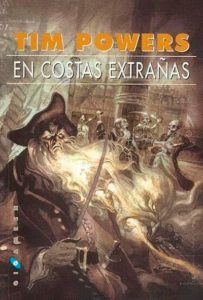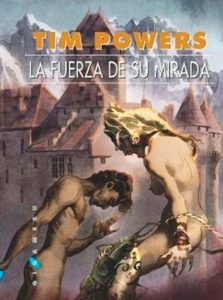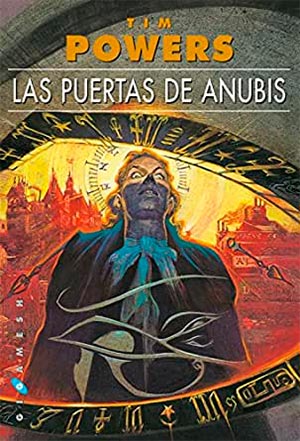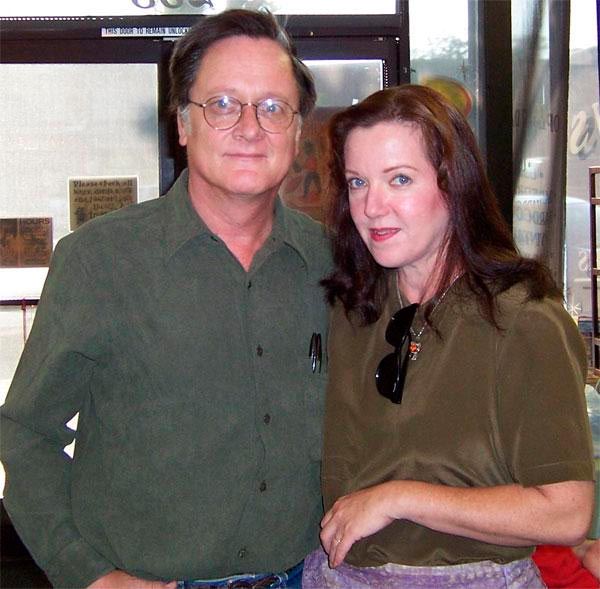Tim Powers (Buffalo, 29 de febrero de 1952) es un conocido autor estadounidense de ciencia ficción y fantasía, ambos géneros combinados con el histórico y las aventuras. Se crió en California y allí reside aún. Estudió Literatura Inglesa en el Cal State Fullerton, lo que le permitió entrar en contacto con James Blaylock y K. W. Jeter; con el conocido y controvertido Philip K. Dick formarían el denominado Grupo de California.
La primera novela publicada de Tim Powers llegó a las librerías en 1979: «The Drawing of the Dark» («Esencia Oscura«), pero la obra que le dio la fama de la que ahora disfruta fue «The Anubis Gates» («Las Puertas de Anubis«), publicada en 1983 y ganadora del premio Philip K. Dick. Otra de sus obras reseñables en el género de aventuras, y muy conocida en España es «En costas extrañas«, reseñada en Fantasymundo, y cuyos derechos para el cine compró hace unos días Disney.
Powers nos atiende desde su casa, donde vive con su mujer y un grupo de traviesos gatos. Un tipo hogareño y comprometido con su profesión de escritor, con las ideas claras y gran talento.
(English version of this interview below spanish one)
Alejandro Serrano: En primer lugar, me gustaría darle las gracias por aceptar esta entrevista, es un honor y un placer. El lector normalmente conoce a un autor a través de sus libros, pero la persona que se esconde tras él permanece oculta. ¿Cómo es un día en la vida de Tim Powers, qué rutinas sigue, cuáles son sus aficiones? Seguramente no es un escritor a tiempo completo…
Tim Powers: Generalmente escribo desde las 10:00 de la noche hasta las 2:00 de la mañana, así que me duermo bastante tarde. Luego tengo que dar de comer a los gatos –a menudo uno o dos han de ser alimentados con un preparado y una jeringa-, y hago las tareas diarias de la casa, como adivinar porque el coche no arrancará o correr a la oficina de correos y cortar las malas hierbas del camino.
En cuanto a las aficiones… bien, enseño escritura de novelas en un “instituto de las artes” un día a la semana, con James Blaylock; eso podría contar como afición, porque es realmente muy divertido. Tanto mi mujer como yo estamos muy interesados en la historia de Los Ángeles y de Hollywood, así que siempre compramos libros sobre el tema y caminamos por los rincones de la ciudad.
Alejandro Serrano: “Las Puertas de Anubis”, “En costas extrañas”, “Esencia Oscura”, “Declara”,… ha escrito muchas otras. Un autor se ve afectado por los libros que escribe, pero no puede mirar continuamente al pasado, ha de refrescar su mente con nuevas ideas. ¿Qué libros suyos no puede olvidar Tim Powers?
 Tim Powers: Oh, me encantan mis viejos libros, y siempre es divertido releerlos cuando tengo que hacer correcciones para una nueva edición o algo parecido. Creo que estoy más satisfecho con “Las Puertas de Anubis”, “La última partida” y “Declara”. Me parece que son las novelas en las que mejor he conseguido plasmar aquello que deseaba conseguir. Lo grotesco, con mucha acción y aventura, tanto como fue posible, ¡y muchos sucesos paranormales!
Tim Powers: Oh, me encantan mis viejos libros, y siempre es divertido releerlos cuando tengo que hacer correcciones para una nueva edición o algo parecido. Creo que estoy más satisfecho con “Las Puertas de Anubis”, “La última partida” y “Declara”. Me parece que son las novelas en las que mejor he conseguido plasmar aquello que deseaba conseguir. Lo grotesco, con mucha acción y aventura, tanto como fue posible, ¡y muchos sucesos paranormales!
Alejandro Serrano: “Las Puertas de Anubis”, “En costas extrañas” y “La fuerza de su mirada” demuestran una capacidad innata para contar una historia en particular, más allá de cualquier personaje atraen y entretienen con solvencia. Quizás son sus mejores novelas, gracias a su conocimiento de los acontecimientos históricos y el tempo de la aventura. ¿Es esta una combinación ganadora? ¿el género de aventuras ha perdido algo? ¿cuáles son sus referencias literarias en éste?
Tim Powers: Crecí leyendo a gente como Rafael Sabatini y Robert Louis Stevenson, así que siempre he disfrutado de las novelas de aventuras. Me gustan sin ironía ni atisbos de “post-modernismo”. Cuando las leo, quiero convencerme de que los sucesos reamente le ocurren a gente real, y que tienen lugar en lugares auténticos. Espero que la tendencia actual hacia el sarcasmo y la ironía no dure. Encuentro muy útil situar a las aventuras fantásticas de forma firme en el mundo real, lo que ayuda a hacer creer al lector que todo es auténtico. Esa ilusión es mucho más difícil conseguirla cuando encuadramos a las tramas en un mundo imaginario (¡también es más sencillo escribir sobre un mundo que no has de inventar!).
Alejandro Serrano: Ha ganado muchos premios, incluyendo el Philip K. Dick, el Mythopoeic Fantasy, el Locus, el World Fantasy, el International Horror Guild… ciertamente es un honor conseguirlos, pero ¿qué le dicen esos premios a nivel personal? ¿son una muestra de calidad literaria o sólo algo que tiene que ver con el mundo editorial?
Tim Powers: Aparte del Hugo, no creo que los premios tengan demasiada influencia en el mundo editorial. Cuando gano uno, me gusta pensar que es un reconocimiento a la calidad literaria, y cuando no gano prefiero creer que los jurados sólo premian a sus amigos. En cualquier caso, es algo bueno tener premios, ya que nos recuerdan que existen historias realmente extraordinarias, y mantienen a los escritores al tanto, ganen o no.
Alejandro Serrano: Al escribir una novela, cada autor tiene su método. Algunos dicen que llega el momento en que los propios personajes toman el control y dictan que debería sucederles, la narración fluye por si misma. ¿Esto le sucede también a usted? ¿Cómo escribe una novela Tim Powers, dispone de un mapa de ideas inicial o simplemente comienza a escribir?
Tim Powers: Intento planificarlo todo en la medida de lo posible antes de comenzar. Me gusta disponer de un mapa detallado que seguir, así me evito andar en círculos por algún lugar poco interesante. Sus contornos son muy amplios y detallados antes de que escriba una sola palabra, así que no, mis personajes jamás toman el control y me dictan. Podría ser conveniente que sucediera, pero temo a mis personajes si les libero, podrían simplemente emborracharse y quedarse en casa.
Alejandro Serrano: Hablando de Philip K. Dick… fue muy amigo suyo, le conoció en 1972, e incluso escribió una página de “Las Puertas de Anubis”; basó el personaje de Valis en usted. Si uno sólo lee biografías o algunos de sus libros, puede creer fácilmente que tratamos con un loco y visionario. Pero la gente no es negra o blanca. ¿Cómo era Dick en las distancias cortas? ¿los medios distorsionaron su vida? ¿todo aquel que tiene una obsesión está loco? En ese caso, todos podríamos serlo…
 Tim Powers: Es cierto, si sólo lees sobre él, es fácil concluir que Dick estaba loco –un adicto a las drogas y visionario que vivía en apartamentos destartalados y creía que Dios hablaba con él-. Pero el hecho es ¡que era el tipo más divertido y escéptico que he conocido! Es cierto que él vino con ideas extravagantes para explicar los sucesos de su caótica vida, pero era también el primero en encontrar fallos en sus teorías y las rechazaba con alegre desdén –a menudo mientras sus amigos casi se habían convencido de ellas- Creo que muchos lectores hacen conjeturas sobre los autores en función de lo que escriben, y no es una política muy fiable. Siguiendo ese camino, por ejemplo, podríamos concluir que Lovecraft creía en lo oculto y que Raymond Chandler era un matón y pistolero.
Tim Powers: Es cierto, si sólo lees sobre él, es fácil concluir que Dick estaba loco –un adicto a las drogas y visionario que vivía en apartamentos destartalados y creía que Dios hablaba con él-. Pero el hecho es ¡que era el tipo más divertido y escéptico que he conocido! Es cierto que él vino con ideas extravagantes para explicar los sucesos de su caótica vida, pero era también el primero en encontrar fallos en sus teorías y las rechazaba con alegre desdén –a menudo mientras sus amigos casi se habían convencido de ellas- Creo que muchos lectores hacen conjeturas sobre los autores en función de lo que escriben, y no es una política muy fiable. Siguiendo ese camino, por ejemplo, podríamos concluir que Lovecraft creía en lo oculto y que Raymond Chandler era un matón y pistolero.
Alejandro Serrano: Cuando a un autor le sonríe el éxito internacional, llega un momento en que la persona encuentra complicado disociarse del escritor. ¿Cómo mantiene los pies en el suelo y conserva su privacidad?
Tim Powers: Ninguno de mis tratos editoriales se introdujo realmente en mi día a día. Mi trabajo consiste en sentarme en mi pequeña oficina con mi ordenador y un montón de gatos que quieren ayudarme a escribir. Cuando no estoy en la mesa de trabajo leo o veo alguna película, o me pregunto que hacer para el almuerzo. ¡Virtualmente la misma rutina que tenía en 1976! Cuando voy a una convención, la gente me reconoce como el autor de tal o cual libro, pero fuera del hotel en el que se desarrollan los encuentros aún soy un tío de mediana edad que conduce un extraño y viejo coche. Es un bonito y manejable equilibrio. No puedo imaginarme como vive gente como Dan Brown.
Alejandro Serrano: Hace unos pocos días, anunció que Disney había comprado los derechos para el cine de “En costas extrañas”, para utilizar algunas de sus ideas en “Piratas del Caribe 4”. Según algunos, las anteriores películas hacían uso de su novela y de la tradicción del género en la literatura y el cine. ¿Qué espera que hagan con sus ideas? ¿teme su uso? Podrían adaptar la novela al completo, en lugar de usar distintas partes en otro proyecto…
Tim Powers: Realmente, no espero nada en concreto de lo que Disney vaya a hacer con la materia prima de mi libro. Seguro que utilizarán la Fuente de la Eterna Juventud, pero sobre el resto del libro… sólo Dios lo sabe. No creo que las películas tengan que parecerse demasiado a los libros que adaptan, y en este caso, en el que pondrán retazos del libro en un mundo de ficción ya establecido, no creo que la película vaya a reflejar mucho la novela. ¡Y eso me parece bien! Una vez le preguntaron a James Cain que pensaba sobre lo que Hollywood había hecho con sus libros, y él hizo un gesto hacia la estantería y respondió: “No les han hecho nada, no los ve ahí?”.
Alejandro Serrano: Crecí junto al mar, y no puedo negar que a veces me gustaría navegar a bordo del “Clamoroso Carmichael» y desaparecer en el Gran Azul… ¿algunas veces no siente la necesidad de ser arrojado y temerario?
Tim Powers: No tanto como lo hice a los veinte años, ciertamente, cuando conducir una moto borracho parecía una cosa sensata. Realmente intento llevar una vida mundana y llena de rutina, ¡las catástrofes se presentan incluso cuando no las deseas!
Alejandro Serrano: Le fascina el ocultismo, como podemos apreciar en la mayoría de sus novelas, particularmente en «Última partida” (Last Call) y el resto de su trilogía «Fault Lines». La tradición del ocultismo es un inextinguible pozo de ideas. ¿Cómo surgió la idea para escribir esta novela? La fascinación es una cosa, pero ¿qué le produce verdadero y visceral terror?
 Tim Powers: Leí que las cartas modernas vienen de las del Tarot, y eso me intrigó, desde el punto de vista de que ambas pueden ser peligrosas. Esto me llevó a releer “The Waste Land” (La tierra baldía), de T.S. Elliot, en la que menciona las cartas del Tarot, y me condujo a los libros de Jessie Weston sobre el Rey Fisher. Y los mitos sobre el Rey Fisher me condujeron a “la capilla peligrosa en el desierto”, que me sugirió la ciudad de Las Vegas. Siempre me ha dado miedo la idea de que alguien toma posesión de mi cuerpo, es una idea que puede dar mucho juego. Así que la incluí en la historia. El desierto del Mojave es un vasto, desolado y atemorizante lugar donde asentar una historia, y ¡afortunadamente Las Vegas está justo en medio!
Tim Powers: Leí que las cartas modernas vienen de las del Tarot, y eso me intrigó, desde el punto de vista de que ambas pueden ser peligrosas. Esto me llevó a releer “The Waste Land” (La tierra baldía), de T.S. Elliot, en la que menciona las cartas del Tarot, y me condujo a los libros de Jessie Weston sobre el Rey Fisher. Y los mitos sobre el Rey Fisher me condujeron a “la capilla peligrosa en el desierto”, que me sugirió la ciudad de Las Vegas. Siempre me ha dado miedo la idea de que alguien toma posesión de mi cuerpo, es una idea que puede dar mucho juego. Así que la incluí en la historia. El desierto del Mojave es un vasto, desolado y atemorizante lugar donde asentar una historia, y ¡afortunadamente Las Vegas está justo en medio!
Alejandro Serrano: ¿Cuál será el siguiente libro de Tim Powers? ¿Qué ideas fluyen por su mente?
Tim Powers: El libro que escribo ahora está situado en el Londres victoriano, y por supuesto habrá complicaciones fantásticas. ¡Aún no quiero decir mucho sobre ello!
Alejandro Serrano: Un autor también es un lector.. ¿qué autores de referencia tiene?
Tim Powers: Para recrearme releo constantemente a Kingsley Amis, Dick Francis, Lovecraft, Fritz Leiber, John D. MacDonald… a menudo intento descubrir como llegaron a conseguir esos maravillosos efectos sobre el lector. Leo mucha no ficción, a menudo como entretenimiento, pero me llevan a tener ideas para escribir libros. Como libros de consulta, ¡tengo cientos! Compro cualquiera cuyo título comience por “La vida cotidiana en…”, y siempre estoy a la búsqueda de la “Biblia” de cualquier tema que necesite saber. Tengo muchas versiones de la Enciclopedia Británica, incluyendo una en CD Rom. Todo esto es suficiente para que me centre en un tema, pero cuando necesito información más concreta sobre algo muy específico, he de salir y comprar más documentación que incida con más detalle en lo que deseo. ¡Así que tenemos un buen montón de libros en casa!
Alejandro Serrano: Como lector y escritor, ¿qué le interesa más, la fantasía o la ciencia ficción? ¿La segunda conecta más con nuestra realidad diaria y puede influenciarla más?
Tim Powers: Supongo que leo más fantasía que ciencia ficción. Me gusta el efecto del vértigo, la desorientación, los cambios que puede inducir al lector, y la fantasía puede hacer eso con más libertad. Aunque al mismo tiempo, hay que hacerlo con más cuidado, para que el lector no llegue al estado de calificarlo todo como un sinsentido-. El tema es que no tiene sentido que las partes más antiguas de nuestros cerebros aún resuenen con la fantasía. Todo el mundo, no importa lo que diga, tiene miedo de los fantasmas si está a solas en una casa oscura a medianoche. No es real, pero no creo que la ficción tenga nada que ver o influencie la realidad actual.
Alejandro Serrano: Gracias una vez más por la entrevista, hace mucho tiempo que deseábamos hablar con usted. Espero que pronto oigamos hablar de su nuevo libro… ¡abrazos desde España!
Tim Powers: ¡Gracias!
—————————————————————–
English version of this interview:
Alejandro Serrano: First of all, I would like to thank you for this interview, it’s an honour and a pleasure. The reader usually meets an author only through his books, but the person behind them remains hidden. How is a day in the life of Tim Powers, what routines do you follow, what are your hobbies? Certainly you are not a writer all the time…
Tim Powers: I generally do my writing from about 10 PM to 2 AM, so I sleep pretty late! Then there are cats to feed — often a kitten or two that needs to be fed «kitten formula» through a syringe — and the usual daily chores like figuring out why the car won’t start and running to the post-office and chopping weeds out of the yard.
Hobbies — well, I teach novel-writing at a «high school of the arts» one day a week, with James Blaylock; that might count as a hobby, since it’s a lot of fun. And my wife and I are interested in the history of Los Angeles and Hollywood, and we’re forever buying books on it and hiking around odd corners of the city.
Alejandro Serrano: “The Anubis Gates”, “On Stranger Tides “, “The Drawing of the Dark”, “Declare”,… and many others. A writer is affected by the books he writes, but can not be looking at the past continuously, had to refresh him with new ideas. What written work can not forget Tim Powers?
Tim Powers: Oh, I’m very fond of my old books, and it’s actually always fun to re-read them when I’ve got to correct proofs for a new edition or something. I think I’m most pleased with The Anubis Gates, Last Call, and Declare — they seem to me to be the ones in which I was able most fully to get the sort of effects I want to get. And I guess those effects are … grotesquerie, and as much action and adventure as possible, and a lot of supernatural events!
Alejandro Serrano: “The Anubis Gates”, “On Stranger Tides” and “The Stress of Her Regard” demonstrate an innate ability to tell a particular story, beyond any characters, they attract and entertain us with solvency. Perhaps they are your best known novels, thanks to your knowledge of history and the tempo of the adventure. Is this a winning combination? Is the adventure genre has lost some? What are your references in it?
Tim Powers: I grew up reading people like Rafael Sabatini and Robert Louis Stevenson, so I’ve always relished adventure stories — and I like them without irony or any taint of «Post-Modernism»! While I’m reading them, I want to be convinced that the events are really happening, to real people, in real places. I hope the modern tendency toward «tongue-in-cheek» and ironic detachment doesn’t last! And I find it useful to set supernatural adventures firmly in the real world, since that helps trick the reader into thinking it’s all real — that illusion would be much harder to sustain if the stories were set in imaginary worlds. (Also, it’s easier to write stories in a world you don’t have to invent!)
Alejandro Serrano: You won many awards, including the Philip K. Dick, the Mythopoeic Fantasy, the Locus, the World Fantasy, the International Horror Guild… it is certainly an honor, but What say to you this awards? They are a standard of literary quality or just something that has to do mostly with the publishing world?
Tim Powers: Aside from the Hugo, I don’t think the awards have much influence in the publishing world. When I win one, I like to think it’s a recognition of literary quality, and when I don’t win I prefer to think that it’s just people bestowing awards on their friends. In any case I think it’s a good thing to have the awards, since they remind us that some stories really are extraordinary, and therefore keep writers aiming at that, whether they actually win any or not.
Alejandro Serrano: When writing a novel every author has his method. Some say that there comes a time in which the characters take over and dictate that should happen to them, the narrative itself flows. Does this happen to you? How writes a novel Tim Powers, there is an initial map of ideas or simply you start writting?
Tim Powers: I try to map it out as thoroughly as I can, before I start. I want a detailed map to follow, so that I don’t wind up traveling in circles in some uninteresting area! My outlines are very long and detailed before I ever begin writing, so no, my characters never take over and dictate the action. That would be convenient, but I’m afraid my characters, if given a free hand, would all just get drunk and stay home.
Alejandro Serrano: Speaking of Philip K. Dick … you were very friend of him, and met him in 1972, he wrote a page of “The Anubis Gates” and Valis is based on you. If you only read biographies or some of his books, you could believe that we are dealing with a crazy man and a visionary. But people are not black or white. How was Dick in short distances? The media distorted his life? Is anyone who just have an obsession a mad person? All we would be crazy in that case …
Tim Powers: It’s true that if you just read about him, you could easily conclude that Dick was crazy — a drug-addicted visionary who lived in shabby apartments and believed God talked to him. But in fact he was the most humorous and skeptical — and kind! — man I think I ever met. It’s true that he came up with outlandish theories to explain the events of his chaotic life, but he was always the first to find flaws in his theories and dismiss them with cheerful derision — often while his friends were still convinced by the theories! I think a lot of readers make guesses about writers based on the things they write — which is never really a reliable policy. At that rate, for instance, you’d conclude that Lovecraft believed in the occult and that Raymond Chandler was a gun-toting tough guy.
Alejandro Serrano: When a writer has enjoyed international success, there comes a time when the person finds it difficult to dissociate from the author. How do you keep your feet on the ground and preserve your privacy?
Tim Powers: None of the book business really intrudes on day-to-day life. My work is sitting in my little office with the computer and a bunch of cats who want to help me type, and when I’m away from the desk I’m reading or watching a movie or wondering what to make for lunch — virtually the same routine as I had in 1976! When I go to a convention, people recognize me as the author of this or that book, but outside of the convention hotel I’m still some middle-aged guy driving a strange old car. It’s a nice, manageable balance! I can’t imagine how somebody like Dan Brown gets through the day.
Alejandro Serrano: A few days ago, you announced that Disney had bought the rights of «On Stranger Tides,» to borrow some ideas in «Pirates of the Caribbean 4». According to some, the previous films of the saga also made use of your novel and the tradition of adventure in literature and cinema. What do you hope they will do with your ideas? Are you afraid of it? They could adapt the novel altogether, instead of using parts in another project…
Tim Powers: I really have no expectations about what Disney will do with the raw material of my book! I’m pretty sure they intend to use the Fountain of Youth, but as for the rest of the book — God knows. But I don’t think movies have to resemble the books they’re based on very closely, and in this case, since they’re fitting pieces of the book into an already-established fictional framework, I don’t imagine the movie will reflect the book much at all. And that’s fine with me! James Cain was once asked, «What do you think of what Hollywood has done to your books?» and Cain waved at the bookshelf and said, «They haven’t done anything to them — see?»
Alejandro Serrano: I grew up on the seashore, and I will not deny that sometimes I would like to travel aboard the «Vociferous Carmichael» and disappear into the Great Sea… Sometimes do you feel the need to be flighty and foolhardy?
Tim Powers: Not as much as I did in my 20s, certainly, when booming around drunk on a motorcycle seemed like a sensible thing to do. Really I try to have a mundane, routine life — catastrophes seem to arrive even when you’re not out soliciting them!
Alejandro Serrano: Your are fascinated by occultism, as we see in most of your novels, notably in «Last Call» and the rest of the trilogy «Fault Lines». The occult tradition is an inexhaustible lode of ideas. How did comes to you the idea to write «Last Call»? Fascination is one thing, but what produces you real and visceral terror?
Tim Powers: I happened to read that modern playing cards are descended from Tarot cards, and that intrigued me, since both of them can be dangerous; and that led me to re-read T. S. Eliot’s «The Waste Land» since it metions Tarot cards, and that led me to Jessie Weston’s books about the Fisher King. And the Fisher King myths include the «perilous chapel in the wasteland,» which suggested Las Vegas. And I guess I’ve always been scared by the idea of somebody else taking over one’s body — I seem to use the notion a lot! — so I imposed that on the story. And the Mojave Desert is a vast, desolate scary place to set a story in, and luckily Las Vegas is right in the middle of it!
Alejandro Serrano: What will be the next book by Tim Powers? What ideas flow through your mind?
Tim Powers: The book I’m writing right now is set in Victorian London, and of course will involve supernatural complications — I don’t want to say too much more than that!
Alejandro Serrano: An author is also a reader … Which authors and books of reference do you have?
Tim Powers: For recreation I’m constantly re-reading Kingsley Amis, Dick Francis, Lovecraft, Fritz Leiber, John D. MacDonald … often trying to figure out how they got their wonderful effects. And I read a good deal of non-fiction, and though I approach it just for entertainment, it often leads me to topics that I eventually base books on. As for research books — I’ve got hundreds! I buy any book called «Day to Day Life in –» and I’m always looking for the «Bible» on any subject: one volume or set of books that will give me everything I need to know about the subject. And I’ve got several sets of the Encyclopedia Britannica, including one on CD Rom. All this is enough to let me focus in on a topic, but when I fix on a specific time-&-place for a book to be written in, I find I’ve got to go out and get more books that deal with that area in ideally-ininite detail. So I wind up with a lot of books around the house!
Alejandro Serrano: What interests you most as a reader and writer, fantasy or science fiction? The latter connects more with our everyday reality and can influence it more?
Tim Powers: I suppose I read more fantasy than science fiction. I like the effect of vertigo, disorientation, that these fields can induce in a reader, and fantasy can do it more freely — though at the same time it has to do it more carefully, since the reader must not be given a moment to remember that this is all, at core, nonsense. The thing is, it’s nonsense that the oldest parts of our brains still resonate to! Everybody, no matter what they claim, is scared of ghosts if they’re alone in a dark old house at midnight. It’s not reality, but I don’t think fiction has any business trying to deal with, or influence, actual reality.
Alejandro Serrano: Thanks for this interview, we wanted to talk to you a long time. We hope to hear soon about you with some new novel… Hugs from Spain!
Thank you!























